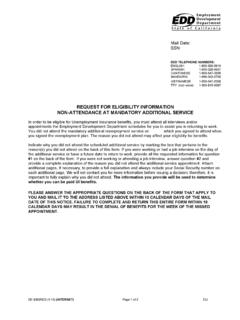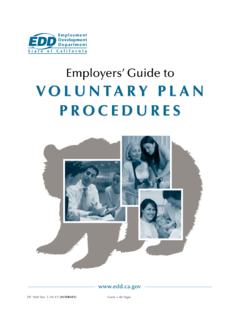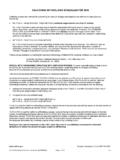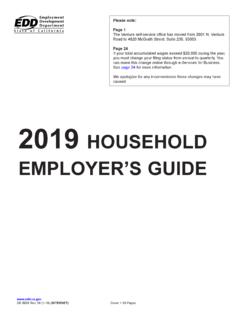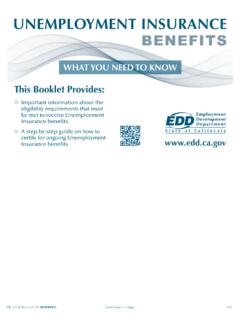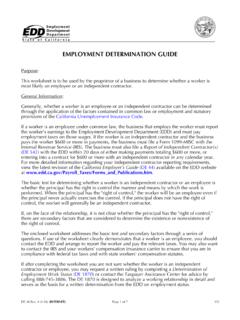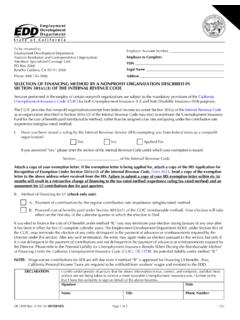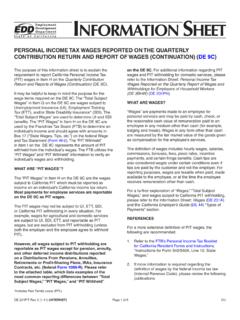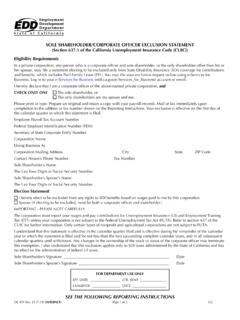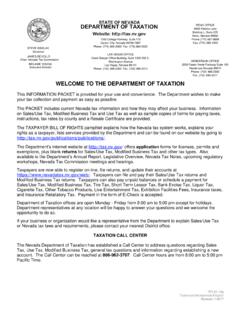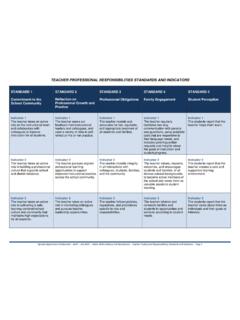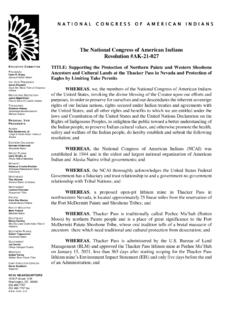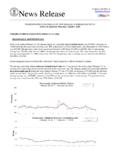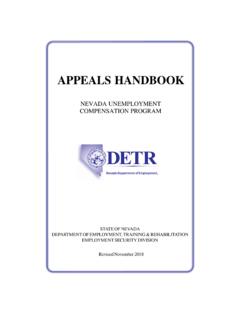Transcription of MULTISTATE EMPLOYMENT - Employment Development …
1 Page 1 of 3 InformatIon SheetUnemployment Insurance (UI), EMPLOYMENT Training Tax (ETT), and State Disability Insurance* (SDI)When an employee performs services in California as well as in one or more other states, the state that has jurisdiction for coverage of that employee s services is determined by the application of four tests (refer to sections 602 and 603 of the California Unemployment Insurance Code [CUIC] below). These tests are applied to determine whether the employee s services are subject to EMPLOYMENT taxes in California or some other state. An employee must perform some service in California before the tests can be applied to determine whether all the employee s services can be allocated to 602 and 603 of the California Unemployment Insurance CodeSections 602 and 603 of the California Unemployment Insurance Code (CUIC) ( ), similar to the provisions of other states laws, provide for the application of four tests to determine if services of employees are considered subject to California law for Unemployment Insurance (UI), EMPLOYMENT Training Tax (ETT), and State Disability Insurance (SDI).
2 These uniform provisions prevent overlapping coverage when an employee performs services in more than one state for a single employer. Application of a test must result in reporting wages to California or another state, or that test does not apply. An individual s services outside of California cannot become subject to California law unless some portion of the services are rendered in this state. These four tests are applied to each employee, not the employer, in descending order:(1) Localization An employee s services are localized in California, and, therefore, considered subject to California EMPLOYMENT taxes if all or most of the employee s services are performed in California with only incidental services performed elsewhere (for example, where the out-of-state service is temporary or transient in nature or consists of isolated transactions).
3 Where the service performed outside of California is either permanent, substantial, or unrelated, it cannot be treated as localized in EMPLOYMENT (2) Base of Operations If test (1) does not apply in any state, services are considered subject to California EMPLOYMENT taxes if some of the services are performed in California and the employee s one and only base of operations for all of his or her services is in California. Base of operations is defined as a more or less permanent place from which the employee starts work and customarily returns to receive employer s instructions, to receive communications from customers or others, to replenish stocks or supplies, to repair equipment, or to perform other functions relating to the rendition of services.(3) Place of Direction and Control If tests (1) and (2) do not apply in any state, an employee s services are considered subject to California EMPLOYMENT taxes if some of the services are performed in California and the place from which the employer exercises basic and general direction and control over all the employee s services is in California.
4 (4) Residence of Employee If tests (1), (2), and (3) do not apply in any state, an employee s services are considered subject to California EMPLOYMENT taxes if some services are performed in California and the employee s residence is in California. Residence means having a more or less permanent place of abode. It is more than a mere transient stopover but does not require the intent necessary to establish a permanent residence in the domiciliary : The tests explained above are used by all states to determine where a MULTISTATE employee s wages should be reported. If wages were reported to another state for services performed in that state within the same calendar year, pursuant to section of the CUIC, the employer may be granted a credit for those reported wages for computation of the California UI taxable wages.
5 In addition, most states, including California, subscribe to the Interstate Reciprocal Coverage Arrangement (IRCA). It provides that an employer may request written approval to report all wages paid to a MULTISTATE employee to any state in which services are performed, the employee has a residence, or the employer maintains a place of business. * Includes Paid Family Leave (PFL).CUDE 231D Rev. 13 (2-22) (INTERNET)Page 2 of 3If interested in making an election to cover employees under California EMPLOYMENT taxes, complete the Employer s Election to Cover A Multi State Worker Under The California Unemployment Insurance Code (DE 2325) (PDF) ( ).If interested in covering the employees under another state s law, then the employer should contact the selected state for of Sections 602 and 603 of the CUIC to a Motion Picture Production WorkerEffective January 1, 2020, sections 602 and 603 of the CUIC were amended to expand the definition of localization for Motion Picture Production Worker (MPPW)
6 To ensure their proper coverage for purposes of UI, SDI and to section 602 of the CUIC, when the service of a MPPW is not localized in any state but some of the service is performed in California and the worker is a California resident, then the worker s entire services qualifies as EMPLOYMENT in to section 603 of the CUIC, when the service of a MPPW is not localized in California but some of the service is performed in California, the services outside of California are temporary or transient if: The worker s residence is in California. The worker is hired and dispatched from California. The worker intends to return to California to seek reemployment at the conclusion of the assignment outside the all factors are met, then the MPPW s entire service is considered subject to Picture Production Definitions Per Section 679 of the CUICAn MPPW is defined as an individual who provides services to a motion picture production company or allied motion picture services company and who is reported as an employee by the motion picture payroll services motion picture production company (MPPC) is any employing unit engaged in the Development , production, and postproduction of a motion picture, excluding the distribution of the completed motion picture and any activities occurring allied motion picture services company (AMPSC)
7 Is any person engaged in an industry closely allied with, and whose work is integral to, a MPPC and who hires from the same pool of craft and guild or union workers, actors, or extras as a motion picture production motion picture payroll services company (MPPSC) is an employing unit that directly or through its affiliated entities meets all of the following criteria: Contractually provides the services of MPPWs to a MPPC or to an allied MPPSC motion picture services company. Is a signatory to a collective bargaining agreement for one or more of its clients. Controls the payment of wages to the MPPWs and pays those wages from its own account or accounts. Is contractually obligated to pay wages to the MPPWs without regard to payment or reimbursement by the MPPC or allied MPPSC motion picture services company.
8 At least 80% of the wages paid by MPPSC each calendar year are paid to workers associated between contracts with MPPCs and employing unit meeting the requirements of a MPPSC or operating as a MPPSC that intends to be treated as an employer of MPPWs must notify the EDD by submitting an Application to be a Motion Picture Payroll Services Company (MPPSC) (DE 679) (PDF) ( ).Personal Income TaxThe Personal Income Tax (PIT) withholding and wage reporting requirements differ from those shown above for UI, ETT, and SDI. Wages paid to a resident employee for services performed within or without this state, or to a nonresident employee for services performed within this state, are subject to California PIT withholding and reportable as PIT wages on the Quarterly Contribution Return and Report of Wages (Continuation) (DE 9C).
9 For PIT purposes only, an employer is an individual or organization that pays wages to employees for services performed within California and meets one or more of the following criteria: Does business in California. Derives income from sources within California. Is subject in any manner whatsoever to the laws of employer that meets the above definition must withhold California PIT and report PIT wages paid to resident employees for services performed within and/or without this state and for nonresident employees for services performed within this paid to a California resident for services performed exclusively in nevada for a company that also has employees working in California are subject to PIT withholding and reportable as PIT wages. However, if the company did not have employees working in California, CUDE 231D Rev.
10 13 (2-22) (INTERNET)Page 3 of 3did no business in California, derived no income from sources within California, and was not subject to the laws of California, the wages paid to a California resident for services performed exclusively in nevada would not be subject to withholding or reportable as PIT Required to Withhold Income Taxes of Other StatesEmployers may need to withhold from the same wage payments when a California resident performs services that are subject to PIT withholding laws of both California and another state, political subdivision, or the District of such cases, the employer will make the withholding required by the other jurisdiction and: For California, withhold the amount by which the California withholding amount exceeds the withholding amount for the other jurisdiction; or Do not withhold any California PIT if the withholding amount for the other jurisdiction is equal to, or greater than, the withholding amount for wages paid, earned within and/or without California, must be reported as PIT paid to a California resident who works in Louisiana for six months and otherwise worked in California are reportable to California as PIT wages for all periods.
